Genre: RPG Developer: New World Computing Publisher: Electronic Arts Players: 1 Released: 1991
The years between 1990 and 1996 were important for western computer games, as it was during that time in which a cluster of companies – Blizzard, id, and LucasArts among them – realized, like Shigeru Miyamoto wondering why Mario couldn’t move beyond a solitary screen, the templates that would inform their releases for the next decade. Of course, it it’s easy today to lament how quickly gaming concepts from the nineties moved from conception to refinement to exhaustion, their forebearers – those games which pioneered sub-genres their creators still toil in – still possess a charm distinct to first-time endeavors. WarCraft: Orcs and Humans is one such game. Here is another.
King’s Bounty was developed by New World Computing in 1990, and if you’ve played Heroes of Might and Magic will seem immediately familiar. This is because King’s Bounty, with its bird’s-eye perspective questing and turn-based battles consisting of awkward paces, is clearly the blueprint for future HOMM iterations. Some will view this as a good thing; some will not. Fortunately, regardless of which camp you’re in, the things that distinguish King’s Bounty from its successors – a simpler interface, and graphics more closely resembling Lite-Brite than DOOM – also made it an ideal candidate to be ported to the Genesis, which it was in 1991.
So King’s Bounty is the prototype for “The Game New World Was Always Trying To Make.” I feel the need to announce this, since the game’s programmers apparently lacked any sense of spectacle, having created an introductory sequence to the game which features medieval balladry in the key of bleep and a title screen which features a staff resembling a stupid-looking space ship from Star Wars. After which, you’ll be prompted to select a character, and – if you’re like me – will choose the “Mad Moham the Barbarian”, because shirtless protagonists seem to possess a robustness others don’t. Lastly is the difficulty: do you want to play on “Easy,” “Normal,” “Hard,” or “Impossible?” I chose Easy, but not without contemplating how absurd life would be if all questions were posed along this gradient: what type of gear-shift do you want, “Automatic,” “Manual,” or “Impossible?” Well, as much as there’s a lot of theoretic appeal to proving I’m adept enough to not cause a pile-up every time I alternate gears merely for the sake of doing so, I can’t chance the ambiguity of the question, so sorry.
King’s Bounty’s gameplay, like HOMM or real warfare, is based upon assembling an army, then venturing into foreign territories to engage in ignoble displays of violence. Whereas in real warfare some combatants tend to survive, though, here no such perk is afforded: before King’s Bounty is beaten the player will doubtlessly sacrifice thousands of unnamed troops, whose successors’ continued willingness to enroll can only be understood as a paean to Feudal Era impoverishment. This was handled slightly more elegantly in HOMM, in which you furnished a castle and trained your own personal army. King’s Bounty, by contrast, wastes no time on such non-destructive gestures, as combatants are hired directly from either their dispersed communities on the map or the eponymous King himself. Thereafter, your lord instructs you on which of the game’s seventeen villains to slay, and who with titles like “Murray the Miser” I can only imagine are guilty of having the world’s worst names.
Regions titled “Continentia,” “Forestria,” and “Saharia,” it ought to be mentioned, are not an accurate measure of King’s Bounty’s intelligence as a product. I say this because, as you’re trotting around having your troops make attack gestures that look like besotted sexual advances, what becomes clear is that King’s Bounty has an addictive quality no less effusive than that of Civilization or Pirates!. Mostly, this has to do with the game’s axioms, which are understandable, and its difficulty progression, which is merciful. But I would still maintain that part of what makes King’s Bounty attractive is that it understands that the accumulation of resources and manpower are not a means to and end, but – inasmuch as the player’s psychology is concerned – an end in of themselves. This is refreshing, having waded through a score of both strategy and role-playing games over the years which feel the need to pad every aspect of their gameplay with vapid philosophizing, thusly presuming their audience would take it for granted if they even momentarily dropped the egghead shtick. Conversely, King’s Bounty is a sort of Shangri-La for pure strategy buffs: a mammon-simulator, that makes no bones about it.
The game’s marginalia, of course, shares no small part of the credit for its success. Its spell system, for example, is as good as any spell system with spell names such as “Find Villain” is going to be (“sorry, wasn’t sure if ‘Dread Pirate Rob’ was on our side”), its controls are fluid, and the way in which distances traveled in the game are tolled in days – of which you have less to finish it in on higher difficulties – is fine, at least in the sense of providing a routine intervention for chronic players. Less forgivable is the game’s multi-player (it doesn’t exist), and the inadvertent mini-game that is its password input; its designers, having coded an excellent game, then failed to discern that ‘O’ and ‘0’ should be different radiuses for the purposes of entering a password including both. I mean radii.
That last point – the password system – is an appropriate metaphor for King’s Bounty’s flaws (sticky note version: “everything but gameplay & control”), since I not only still completed what a broken password system ought to prevent, which is the game, but also enjoyed it more than, say, Chrono Trigger or Ogre Battle in the process. And while some may decry a comparison to those venerated titles, may I suggest that you know you’ve got a solid product on your hands when it can’t even fail convincingly? I keep remembering the words of Prince Barrowpine, in the plot summary that comes packaged with the game: “Really Magus, you shouldn’t go around destroying my illusions like that.” Wise words for a critic, Prince, though I am unable to take them to heart.
SCORE: 10 out of 10


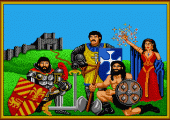
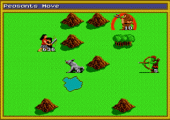
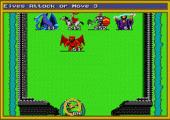
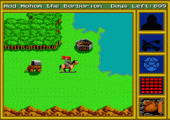
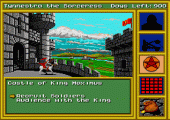
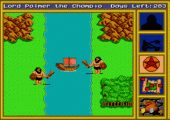
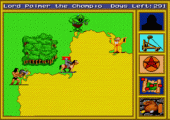
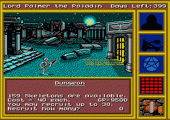
Recent Comments